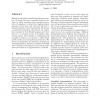Free Online Productivity Tools
i2Speak
i2Symbol
i2OCR
iTex2Img
iWeb2Print
iWeb2Shot
i2Type
iPdf2Split
iPdf2Merge
i2Bopomofo
i2Arabic
i2Style
i2Image
i2PDF
iLatex2Rtf
Sci2ools
115
click to vote
ENTCS
2000
2000
A Space Semantics for Core Haskell
Haskell currently lacks a standard operational semantics. We argue that such a semantics should be provided to enable reasoning about operational properties of programs, to ensure that implementations guarantee certain space and time behaviour and to help determine the source of space faults. We present a small-step deterministic semantics for the sequential evaluation of Core Haskell programs and show that it is an accurate model of asymptotic space and time usage. The semantics is a formalisation of a graphical notation so it provides a useful mental model as well as a precise mathematical notation. We discuss its implications for education, programming and implementation. The basic semantics is extended with a monadic IO mechanism so that all the space under the control of an implementation is included.
Related Content
| Added | 18 Dec 2010 |
| Updated | 18 Dec 2010 |
| Type | Journal |
| Year | 2000 |
| Where | ENTCS |
| Authors | Adam Bakewell, Colin Runciman |
Comments (0)

